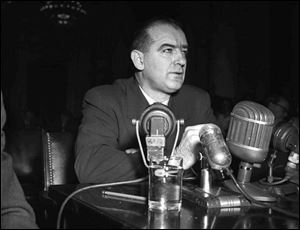
Bully gets his due in the gripping Point of Order
11/3/2005
Sen. Joseph McCarthy testifies before a Senate subcommittee in 1950.
If you go see George Clooney s harrowing Good Night, and Good Luck (opening tomorrow in Toledo), pay close attention to the actor who plays Sen. Joseph R. McCarthy. He giggles. He froths at the mouth. His eyes shift from side to side. His face rises up in his collar, his jowls spill over the top. His voice is a whine, his arrogance matched only by his self-satisfied air of entitlement.
The guy is over the top.
When Clooney began showing the film to younger people unfamiliar with McCarthy and his insistence that communist subversives had infiltrated every nook and cranny of the American government, military, and private society, audiences told Clooney that the one actor they just did not believe was this guy. And the guy wasn t acting.
Good Night, and Good Luck, which tells the story of how CBS reporter Edward R. Murrow contributed to the public scrutiny and downfall of McCarthy, shifts between re-created black-and-white moments and footage of the actual McCarthy. The man plays himself, and it s a portrait of paranoia and madness and civil liberties being trampled in the name of national security.
The footage matches perfectly, and if it whets your appetite (if you have any left when it s over) for more grand, absurdist political theater, you do not want to miss Point of Order (New Yorker Films, $29.95, available Nov. 14), a gripping, little-seen 1964 assemblage of the 1954 McCarthy hearings the ones featured in Clooney s film, famously culminating with Boston trial lawyer Joseph Welch arriving at a very simple yet powerful conclusion when he asks the snickering senator from Wisconsin: Have you no decency, sir? At long last, have you left no sense of decency?
Theater, by the way, is the operative word here. Point of Order was put together by documentary filmmaker Emile de Antonio, who died in 1989. He edited six weeks (and 187 hours) of testimony down into a 90-minute film that has sat on many shelves for 40 years probably because de Antonio, somewhat the way Murrow did, chooses to have McCarthy choke on his own rhetoric. There is no narration, no context not even an explanation of what the hearings are about.
What the hearings actually did, what you watch them do in this film, was expose McCarthy as the bully and self-righteous destroyer of people that he was. Welch is not above theater himself: He tears up evidence McCarthy places before him, waves around a letter from J. Edgar Hoover that turns out to be a fake. But it s McCarthy s show, and as he gets more bitter and threatening, the room in the film grows more and more silent and empty and tomblike. That s when you know McCarthy s finished. He s ranting to a circus that long left town without him.
•
THE BEGINNING OF THE END: Finally, an answer. How is it that the latest Star Wars movie didn t stink at all? Well, among the five deleted scenes included on Star Wars: Episode III Revenge of the Sith (Fox, $29.98) are at least three that would have tanked the final and moving chapter of George Lucas space saga. These scenes are so lifeless it must have taken all of Lucas willpower not to include them, however relevant they are to the overall shape of the series.
In one, Natalie Portman plans the first stirring of the Rebellion I mean, this woman can plan. In another, she presents the evil Chancellor Palpatine with a petition you read that right: a Star Wars movie with a petition.
What works much better is the deleted scene of Yoda going off to live in the swamps of Alabama or somewhere. Another fun extra: an hour-long documentary on every person it takes to construct 49 seconds of a Star Wars film including caterers, and the payroll office people.
But the best thing about having the last Star Wars film on DVD? You can watch all six films in order now, and notice, along with Lucas, the lapses in logic. On the commentary track, he points out that the Death Star is half finished in Sith and not completed until A New Hope, the 1977 film that takes place some decades later. The reason?
Supply problems and union disputes and a few design problems that they had to work out. It took longer than you would have thought even for the Empire.
•
WHERE THERE S A WILL: Has Will Ferrell worn out his welcome, or is he regrouping for a comeback? His shrill turn in Bewitched (Columbia, $28.95) suggested overexposure even as his role in Woody Allen s Melinda and Melinda (Fox, $27.95) screamed he was becoming a one-joke pony.
The joke? The gentle doofus. His signature one-liner? More cowbell!
Ferrell is a very funny man at a time when we generally demand that very funny men show us more range.
His test comes in the next 12 months: With a scene-stealing performance in the upcoming adaptation of Broadway s The Producers, he could forever be known as a consummate scene stealer. Or, doing his gentle doofus on a subdued scale for the independent Winter Passing, he could be known as a funny man with a limited bag of tricks. Or, the third option: He could pull a Tom Hanks, who would have been making Turner & Hooch: Dog School now if he hadn t quietly replaced glib with poignant.
Will, more cowbell!
Contact Christopher Borrelli at: cborrelli@theblade.com or 419-724-6117.